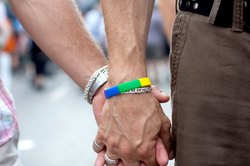
What protects lesbian, gay, bisexual, and transgender (LGBT) youths from considering suicide and, conversely, what makes them most vulnerable to it?
The question is of paramount concern because these individuals are at least twice as likely to attempt suicide than heterosexual youths, prompting the national It Gets Better Project with encouraging video messages from such public figures as Lady Gaga and President Barack Obama.
The first longitudinal study to look at suicide ideation and self-harm in this population shows support from friends and family offers the most protection in preventing youths from thinking about suicide. Adolescents who know they can talk to their parents about problems and know they have friends who care about them are less likely to consider ending their lives, according to new Northwestern Medicine® research.
Adolescents most likely to consider killing themselves and engage in self-harm behaviors are those who feel victimized for being gay. About 94 percent of LGBT youths have had at least one experience in which people said cruel things to them, spit on them, destroyed their property and threatened or assaulted them – all related to them being gay, according to prior Northwestern University research.
Suicidal thoughts are a key predictor of a suicide attempt. Cutting behaviors also are a risk factor.
Previous studies of LGBT adolescents looked at their risk of making suicide attempts, not predictors that make them vulnerable to it or protect them from it.
“Our research shows how critical it is for these young people to have social support and for schools to have programs to reduce bullying,” said Brian Mustanski, PhD, associate professor of medical social sciences at Northwestern University Feinberg School of Medicine. “We believe this will help save young lives.”
Mustanski is the lead author of the study, which is published in the American Journal of Preventive Medicine.
For the 30-month study, 246 Chicago-area sexual minority youths, ages 16 to 20 at enrollment, were interviewed at five time points, six months apart. Most prior research on LGBT populations has been with adults, but Mustanski emphasized the importance of studying adolescents, since suicide is the third leading cause of death among all youth.
How to Offer Support
When a child comes out to parents, a good reaction is one of acceptance instead of judgment, noted Mustanski, who is a clinical psychologist. “This lets teens know their parents are approachable for support and are unconditional in their love,” he said. An example of an accepting response is, “You are still the same child as you were before you told me, and I love you just the same.”
Parents also should be aware that they play an important role in helping to prevent their child from being bullied and in promoting their child’s mental and physical health. As with all kids, it’s important for parents of gay teens to monitor and teach them about safer sex to avoid HIV/AIDS, Mustanski said.
Mustanski directs Northwestern’s IMPACT program, whose website is a source for youth, their families, and policymakers to learn more about the health and development of LGBT youth. The site’s content includes engaging videos and games on issues like coming out, having healthy relationships, and dealing with stress and bullying. The IMPACT program conducts health research and translates the findings into interventions to improve the health of sexual minority people.
Resources for Families and Schools
Parents, Families, & Friends of Lesbians and Gays offers programs to teach parents and friends how to be supportive of their gay children and peers. Safe Schools Coalition and Gay Straight Alliance Network are resources for reducing bullying in schools.






